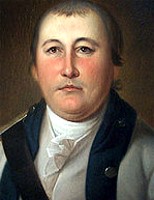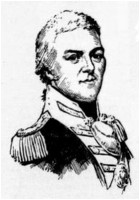At the outbreak of the American Revolution in April 1775 Nathan Pushee enlisted as a private in Gardner's Massachusetts Battalion and took part in the battle of Bunker Hill.
In March 1776 he was transferred to the Life Guard protecting General George Washington, serving with it until the end of the year. The following January Pushee re-enlisted in the 3rd Continental Light Dragoons, and was promoted trumpet-major. With this unit he was engaged in the battles of Brandywine, Paoli, Germantown, and Monmouth. The records for the 1777 & 1778 "winters at Valley Forge" showed the name Nathan Pushee.
In September 1778 Pushee was at Old Tappan, N.J., when the dragoons were surprised at night by British forces, and was one of the few who escaped.


William Washington -- Uniform of a Trumpet-Major
Re-enlisting again in December 1779, Pushee became trumpet-major in Washington's Light Dragoons (into which his former regiment was incorporated) and moved to the southern theatre. The commander of the regiment was William Washington, a kinsman of George Washington, and this circumstance accounts for the false tradition that Pushee was George Washington's trumpet-major.
On 14 April 1780 Pushee was among the victims of another successful surprise attack by the British when he was captured in the engagement of Moncks Corner. Taken to Charleston, S.C., Pushee and more than 500 comrades faced almost certain death from disease and poor food in British prisons, and in order to escape this fate they agreed to enlist in the British army provided they did not have to fight their fellow Americans.
Pushee joined the Duke of Cumberland's Regiment, a provincial unit, and was sent to Jamaica, where he became a sergeant in Captain Gideon White*'s company. At the end of the war those who had served in British regiments could not return to the United States because they were excluded from the terms of amnesty. The commander of Pushee's regiment, Lord Charles Greville Montagu, arranged for those men who wished land to be taken to Nova Scotia, and they arrived in December 1783.
American Revolution (HISTORY)
Lord Montagu raised 5 companies of 100 men each in Charleston and Camden, South Carolina as well as African slaves for service in Jamaica or elsewhere.[3] Montagu recruited rebel prisoners who agree to fight the Spanish - not their fellow Americans. The regiment was involved in a skirmish.[4] In August 1781, the regiment sailed for Jamaica and spent the war there. The second Battalion and Lord Montagu arrived in New York on 4 April 1783 to recruit for the Battalion. The Duke of Cumberland's Regiment was disbanded in Jamaica on 24 October 1783.[5]
Resettlement in Nova Scotia

Captain Gideon White, Nova Scotia
Captain Gideon White's company was allowed to settle in Nova Scotia, settling at Shelburne, Nova Scotia. Sgt. Nathan Pushee settled at Chedabucto (present-day Guysborough), eventually founding present-day Amherst, Nova Scotia.[6] Montagu died soon after he arrived in Halifax and is buried at St. Paul's Church (Halifax), Nova Scotia
In the spring of 1784 they went to Chedabucto Bay, where the following year Pushee received 200 acres in Manchester Township. Pushee and some fellow soldiers did not remain in the area long, since they wanted to find more fertile lands closer to the water.
They went to Antigonish Harbour, where disbanded soldiers under Lieutenant-Colonel Timothy Hierlihy had already settled at Town Point. The attempt to establish a village at Town Point failed, and Pushee moved to the rich intervale lands on the south side of the West River, on what became St Andrew's Street in the town of Antigonish.
The Napoleonic Wars brought a demand for timber in Britain, and Antigonish flourished because it was at the junction of two rivers down which timber could be floated. Pushee erected a sawmill, and sold it in 1818 to his son Henry and John G. Peabody.
Considered by some as the founder of Antigonish, in the census of 1827 he was listed as a farmer with 35 acres under cultivation, 18 horned cattle, 30 sheep, and 6 pigs. Pushee served as an officer in the local militia and as a school trustee, and was one of the founders of the Dorchester Presbyterian church.
In 1838 a more lenient act of the American Congress and newspaper publicity about a fellow soldier suggested to Pushee that he apply for a pension as an American soldier. In his application from Boston, dated 6 October, he ignored his time in the British army and said only that he was taken prisoner at Moncks Corner and escaped after 11 months' captivity.
On the 12th he was paid $1,056 in back pension and shortly thereafter left for Nova Scotia, where he visited old friends at Newport. There the excitement and strain of travel brought on a fatal heart attack.
Nathan Pushee Jr referred to above is the progenitor of the Pushie's of Antigonish, Nova Scotia.